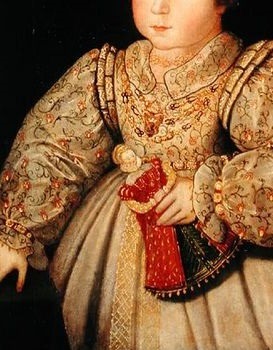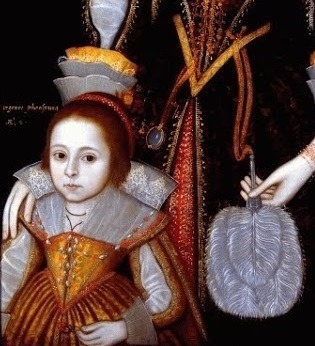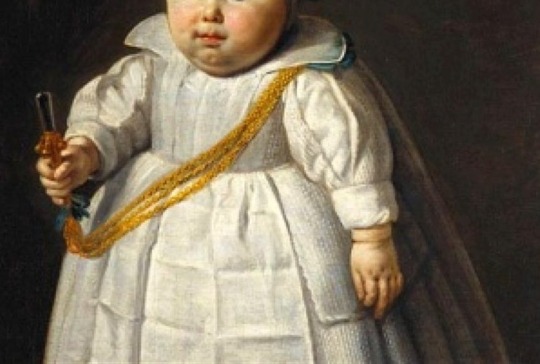
Elizabeth was only two years and eight months old when her mother, Anne Boleyn, died on the scaffold. Anne had provided for her daughter as best she could in the last days of her reign, buying clothing for her - the last Elizabeth would receive for a long while.
 Elizabeth last saw her mother in January 1536, after the celebrations for Katharine of Aragon’s death. Anne’s expense reports show that Elizabeth was at her own household by January 18. Though Elizabeth would later be told a tale of Anne Boleyn, clasping her baby in her arms and pleading with Henry right before her arrest in May, the story is unlikely to be true.
Elizabeth last saw her mother in January 1536, after the celebrations for Katharine of Aragon’s death. Anne’s expense reports show that Elizabeth was at her own household by January 18. Though Elizabeth would later be told a tale of Anne Boleyn, clasping her baby in her arms and pleading with Henry right before her arrest in May, the story is unlikely to be true.Elizabeth was cared for by Sir John and Lady Shelton, along with her governess, Lady Bryan. Lady Shelton was the sister of Anne’s father, and though they shared no emotional affection, she trusted that Lady Shelton would take good care of her baby. And her faith seems to have been well-placed. Though Lady Shelton had been instructed by the king’s council to treat Princess Mary harshly, Lady Shelton stood up to them and insisted that Mary was so virtuous she deserved to be treated with honor and respect.
After Anne was slain, it seems no one told the child of her mother’s death. But the little girl was too intelligent and perceptive not to notice the changes to her lifestyle and the title by which she was addressed. Legend has it Sir John was the one she asked about it.
"How hath it, yesterday my Lady Princess, and today but my Lady Elizabeth?"It’s not recorded how Elizabeth reacted to the news. She probably had little emotional attachment to her mother - in her little mind Anne was a nice woman Elizabeth saw on occasion who sent her presents. Lady Bryan was probably the one to whom Elizabeth was most attached. But Lady Bryan was suffering her own loss at the moment, as her husband died only a month after Anne Boleyn went to the scaffold. It must have been a very frightening and confusing time for the toddler.
 Cromwell had apparently visited Elizabeth’s lodgings after her mother’s fall to give instructions to her household, but there was some confusion amongst the staff about the little ex-princess’s rank, and thus what level of respect she was to be accorded.
Cromwell had apparently visited Elizabeth’s lodgings after her mother’s fall to give instructions to her household, but there was some confusion amongst the staff about the little ex-princess’s rank, and thus what level of respect she was to be accorded. Worse, no income had been allotted for Lady Elizabeth’s personal needs, and the child had outgrown all of the clothing her mother had made for her before her death. In a letter from August, 1536, Lady Bryan begs Cromwell for help.
Worse, no income had been allotted for Lady Elizabeth’s personal needs, and the child had outgrown all of the clothing her mother had made for her before her death. In a letter from August, 1536, Lady Bryan begs Cromwell for help.. . . My lord, when your lordship was last here, it pleased you to say, that I should not mistrust the king’s grace, nor your lordship. , Which word was more comfort to me than I can write, as God knoweth. And now it boldeneth me to show you my poor mind. [...]
Now, so it is, my lady Elizabeth is put from that degree she was afore; and what degree she is at now, I know not but by hearsay. Therefore I know not how to order her, nor myself, nor none of hers that I have the rule of; that is, her women and her grooms. Beseeching you to be good lord to my lady and to all hers; and that she may have some rayment. For she hath neither gown, nor kirtle, nor petticoat, nor no manner of linen, nor foresmocks, nor kerchiefs, nor sleeves, nor rails, nor body-stitchets, nor mufiiers, nor biggins. All these, her grace’s mostake [”must take” or needs] I have driven off as long as I can, that by my troth, I cannot drive it no longer. Beseeching you, my lord, that you will see that her grace may have that is needful for her,as my trust is ye will do;—that I may know from you by writing how I shall order myself; and what is the king’s grace’s pleasure and yours, that I shall do in every thing.

About two weeks later, Sir John wrote back to Cromwell:
I perceive by your letter the King's pleasure that my lady Elizabeth shall keep her chamber and not come abroad, and that I shall provide for her as I did for my lady Mary when she kept her chamber. Have me in remembrance for the King's warrant you commanded me to deliver to Master Wrisley for money for the household, otherwise I cannot continue it.
 Henry seems to have taken out his ill feelings toward Anne Boleyn on their daughter, just as he had once done with Princess Mary. But in Elizabeth’s case, he could not justify it by pointing to his daughter’s willfulness. Elizabeth was an innocent toddler who had done nothing to “deserve” her father’s neglect of her most basic needs.
Henry seems to have taken out his ill feelings toward Anne Boleyn on their daughter, just as he had once done with Princess Mary. But in Elizabeth’s case, he could not justify it by pointing to his daughter’s willfulness. Elizabeth was an innocent toddler who had done nothing to “deserve” her father’s neglect of her most basic needs.Henry’s purpose in confining Elizabeth to her chambers was the same reason he’d ordered Mary into isolation: to keep people from seeing her and hoping she would disappear from the public eye. Poor, friendless, forgotten, Elizabeth would be no competition for the children Henry was sure he would father with Jane Seymour.
The next time Elizabeth would see her father would be at Christmas, 1536. Mary, restored to her father’s favor through Jane Seymour’s efforts, sat at the high table with him; Elizabeth was seated somewhere out of sight.
Throughout Elizabeth’s childhood, she was in and out of favor with her father, and it would be Henry’s queens who took pity on her and urged Henry toward grudging kindness to the child. When Anna von Kleefes wanted to bring Elizabeth to court, Henry cited Anne Boleyn as a reason against it, saying Elizabeth had a mother so different from Anna that she shouldn’t want Elizabeth around, but Anna insisted.
 Elizabeth made Henry uncomfortable. Every time he saw Elizabeth’s dark eyes, did he think of Anne Boleyn?
Elizabeth made Henry uncomfortable. Every time he saw Elizabeth’s dark eyes, did he think of Anne Boleyn?Katheryn Howard made a great effort for Elizabeth because of their blood ties, seating Elizabeth across from her at the dinner table. But it was Kateryn Parr who would prove to be Elizabeth’s greatest ally.

No comments:
Post a Comment